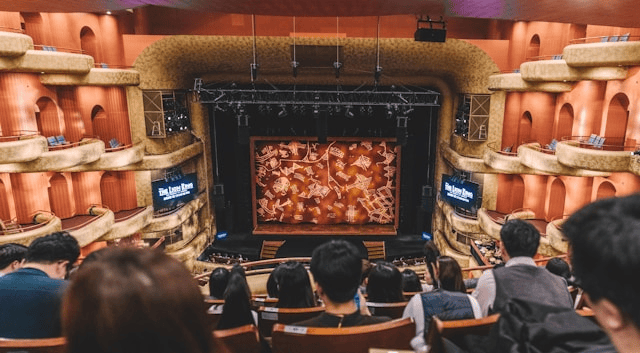In an age where streaming services, virtual reality, and digital media dominate the entertainment landscape, it’s easy to question the relevance of traditional art forms like live theater. With movies available on demand, TikTok videos offering instant amusement, and binge-worthy series at our fingertips, the slower, more deliberate world of stage performance may seem outdated to some. Yet, despite the digital revolution, live theater continues to thrive and for good reason.
Live theater remains a powerful and irreplaceable form of artistic expression. It offers an emotional depth, cultural richness, and communal connection that no screen can replicate. In this article, we explore the importance of stage performance, the unique magic of live shows, and why theater still matters in the digital age.
The Unique Power of Live Performance
There is something profound about watching a story unfold in real-time, with real people, in the same room as you. This immediate, unfiltered interaction between actor and audience is at the heart of why theater matters.
Live performance creates a raw, emotional atmosphere. You’re not just watching a character you’re breathing the same air, feeling the same energy. Every moment is unique and unrehearsable in its authenticity. A dropped line, a sudden tear, a burst of laughter they all create a once-in-a-lifetime moment that can’t be paused, rewound, or replayed.
Unlike digital content that’s edited and produced for perfection, theater embraces imperfection. It thrives on spontaneity and vulnerability, making each performance deeply human and incredibly real. That’s why the live performance experience still holds a powerful allure for audiences today.
Cultural and Historical Significance
Theater has been a cornerstone of human storytelling for thousands of years. From ancient Greek tragedies to Shakespearean drama to contemporary Broadway hits, theater reflects the heartbeat of society.
Its cultural significance lies in its ability to preserve and present stories that shape our understanding of identity, politics, love, and power. Theater doesn’t just entertain it educates and provokes thought. When we ask why theater matters, we’re also asking why stories matter, why shared truths and perspectives matter.
Stage performance has often been at the forefront of societal change. Plays have challenged norms, exposed injustices, and inspired revolutions. Even today, modern productions continue to tackle issues such as race, gender, inequality, and mental health, proving that live theater remains a relevant force for social commentary and cultural preservation.
Live Theater vs. Digital Entertainment
It’s tempting to compare theater and digital entertainment, but they serve fundamentally different purposes. Streaming is convenient, personalized, and polished. Theater, on the other hand, is immersive, unpredictable, and immediate.
Digital content can be consumed passively while eating, working, or scrolling your phone. Theater demands attention. When you attend a stage performance, you’re fully present. You’re not just watching a story you’re part of it.
Unlike movies or shows that can be paused or rewatched, theater is a one-time event. Every show is a living, breathing experience. This ephemeral nature makes live theater in the digital age even more valuable because it reminds us that some moments are meant to be lived, not recorded.
The Communal Experience
One of the greatest gifts of live theater is the communal bond it creates. Sitting in a darkened room with hundreds of strangers, laughing, crying, or gasping together it’s a shared emotional journey. That kind of connection is rare in our increasingly isolated digital lives.
Live theater fosters empathy. Seeing diverse stories told by real people on stage allows us to step into others’ shoes and expand our worldview. The energy that flows between the audience and performers creates a unique, reciprocal experience that unites people, however briefly.
The importance of stage performance extends beyond the play itself it’s about being part of a collective experience that celebrates creativity, vulnerability, and humanity.
Innovation and Adaptability in Modern Theater
Contrary to the belief that theater is outdated, it continues to evolve. Today’s productions integrate technology, multimedia, and interactivity to stay fresh and innovative. Projection mapping, digital sets, live-streamed performances, and immersive environments are becoming common.
Small, independent theater companies are pushing boundaries with experimental formats, site-specific shows, and community-driven storytelling. Hybrid models that blend live and digital elements allow theater to reach new audiences while retaining the core essence of human connection.
Live theater in the digital age doesn’t resist change it adapts to it while maintaining its authenticity. That’s what makes it not just relevant but exciting.
Theater’s Role in Education and Personal Growth
Live theater plays a vital role in education, offering powerful tools for learning across disciplines. It brings literature, history, and social studies to life in a way no textbook can. Watching a play about the civil rights movement or ancient Rome creates emotional and intellectual engagement that lasts far beyond the classroom.
Theater also fosters personal development. Students involved in drama programs build confidence, empathy, teamwork, and communication skills. These are essential life tools in both personal and professional settings.
By showing real human emotion, consequences, and conflict, theater becomes more than entertainment it becomes a mirror for self-reflection and growth.
Final Thoughts
In a world saturated with content, live theater stands out by offering something profoundly human. It’s not about competing with digital media it’s about offering a different, deeper experience.
Live theater is still relevant because it satisfies a timeless need: the need to connect, to understand, and to feel. It preserves cultural heritage, pushes creative boundaries, and brings people together in meaningful ways. It doesn’t need flashy effects to leave a lasting impression just a stage, a story, and an audience willing to listen.

